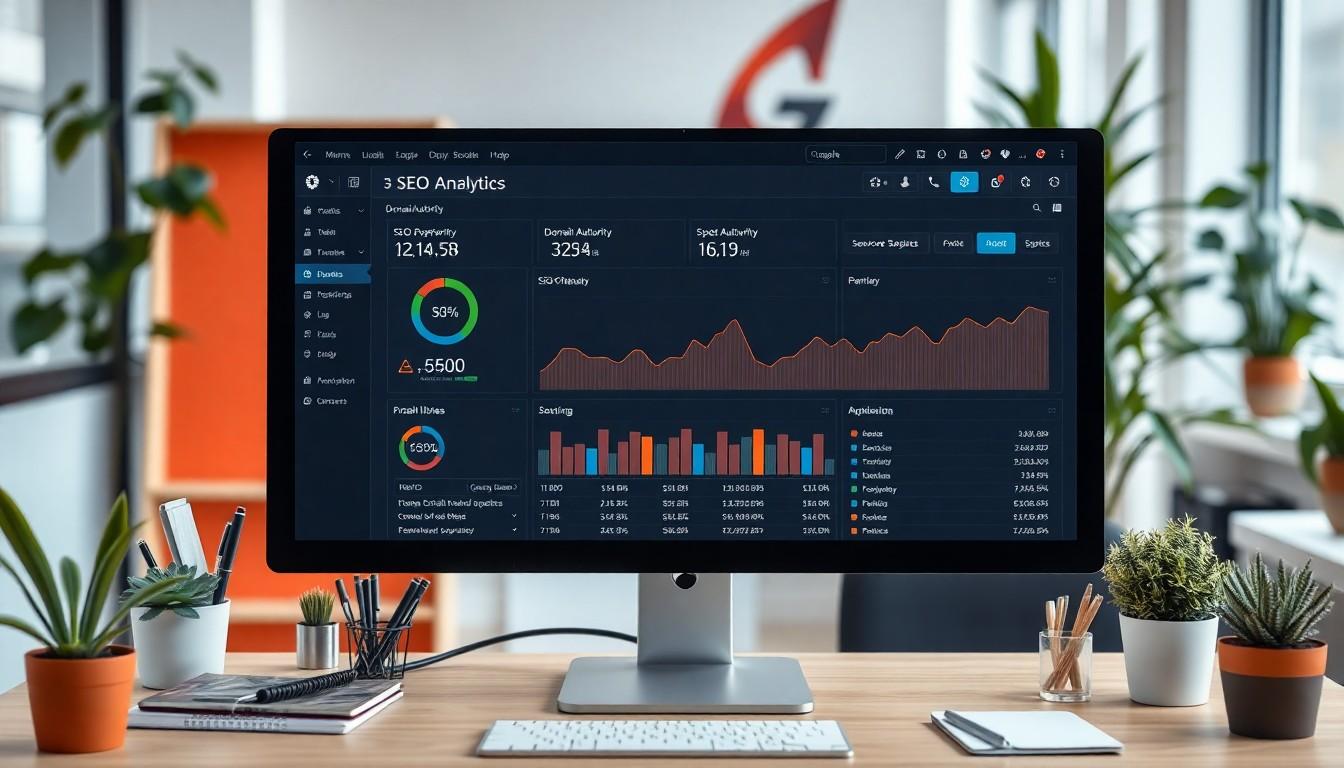Did you know that nearly 90% of websites never make it to the first page of search results? For small businesses striving to stand out online, this can feel like an uphill battle. One crucial factor influencing search visibility is domain authority. Knowing the answer to how do I fix domain authority can be the game-changer that propels a website from obscurity to prominence.
In this article, readers will discover actionable strategies to enhance their domain authority, from improving on-page SEO to building quality backlinks. By implementing these techniques, anyone can boost their site’s credibility and climb the search engine rankings, ultimately driving more traffic and potential customers.
Small businesses often struggle to rank high on search engines. Optimizing their digital footprint involves multiple strategies. Here’s a breakdown of effective tactics small businesses can implement.
Understanding Domain Authority
Search engine optimization (SEO) involves various strategies to improve a website’s visibility. By utilizing effective SEO techniques, small businesses can enhance their online presence. A website SEO audit identifies strengths and weaknesses. This audit includes examining website structure, content quality, and keyword usage.
Keyword Research
Keyword research helps discover phrases potential customers use to find products or services. Implementing these keywords throughout the website leads to improved rankings. Small businesses should use tools like Google Keyword Planner or SEMrush to find relevant keywords that fit their industry.
On-Site SEO Optimization
On-site SEO optimization includes every element on the website aimed at improving rankings. Utilizing proper headers, descriptive URLs, and optimizing images enhance search engine readability. Small businesses should also ensure their content is structured, using SEO-optimized content to engage visitors effectively.
For more on website optimization techniques, consider resources available at Scale by SEO.
Building Quality Backlinks
Backlinks serve as endorsements of a website’s credibility. Securing high-quality backlinks boosts domain authority. Small businesses can engage in backlink services through guest blogging, partnerships, and relevant directories.
Guest Blogging
Writing guest blogs on established sites offers exposure and potential backlinks. Each post should include relevant information, enticing readers to visit the home site. Small businesses can also leverage their expertise by creating insightful blog content, which attracts links from other sources.
Collaboration with Local Businesses
Collaborating with local businesses can enhance credibility and create backlink opportunities. Cross-promotional strategies allow businesses to tap into each other’s audiences while building a strong online community.
For detailed strategies on acquiring backlinks, refer to Scale by SEO’s guide.
Leveraging Google Business Profile
A Google Business Profile is essential for local SEO strategies. By setting up a profile, businesses can appear in local search results, attracting nearby customers.
Profile Optimization
Optimizing the Google Business Profile includes ensuring the business name, address, and phone number are accurate. Adding high-quality images and customer reviews can significantly impact local search visibility. Utilizing posts on the profile can engage users and provide updates, enhancing customer interaction.
Encouraging Reviews
Encouraging customers to leave positive reviews boosts the business’s credibility. Businesses should respond to all reviews, showcasing excellent customer service. Positive reviews also influence future buyers, as many consumers read reviews before purchasing.
Implementing these strategies can greatly improve a small business’s online presence, enhancing visibility and driving potential customers to their websites. For a comprehensive approach to digital marketing, explore Scale by SEO’s resources.
Small businesses often face unique challenges when striving for visibility in the online marketplace. SEO, or search engine optimization, provides essential tools for improving a business’s online presence. This article explores three essential aspects of SEO: on-site optimization, content marketing, and backlink strategies, offering practical tips for implementation.
Factors Affecting Domain Authority

Title Tags and Meta Descriptions
Title tags and meta descriptions serve as a webpage’s first impression in search results. Optimize these by including relevant keywords, keeping them concise, and accurately reflecting the page content. For instance, a title like “Affordable SEO Packages for Small Businesses“ directly informs users about the page’s focus.
Header Tags and Content Formatting
Utilize header tags (H1, H2, H3) to organize content logically. This not only enhances user experience but also assists search engines in understanding the content hierarchy. Create engaging, SEO-optimized content that addresses user intent and includes target keywords naturally. Short paragraphs and bullet points can improve readability and user engagement as well.
Images and Alt Text
Incorporate images to enhance visual appeal, but don’t neglect optimization. Use descriptive file names and alt text that incorporates keywords related to the image context. This practice improves accessibility for visually impaired users and aids search engines in indexing the images appropriately.
For more on effective on-site SEO practices, check out our detailed guide on SEO Services.
Content Marketing Strategies
Content marketing plays a crucial role in attracting traffic and establishing authority. Producing high-quality, valuable content encourages engagement and enhances overall SEO.
Blogging
Regularly publish blog posts addressing relevant topics for your audience. Blogging allows businesses to demonstrate expertise, answer common questions, and showcase products or services. Aim for SEO-optimized content that encourages user interaction. For example, a blog post titled “Top 5 Local SEO Tips for Small Businesses“ can draw in users searching for localized guidance.
User-Generated Content
Encouraging customers to contribute reviews, testimonials, or case studies builds credibility and provides fresh content without significant investment. Showcase positive customer experiences on your site and within marketing materials.
Content Distribution
Promote content through various channels, including email newsletters, social media, and community forums. Strategic sharing increases visibility and drives traffic back to the website, enhancing overall SEO performance. A consistent distribution strategy maximizes exposure and engagement.
Explore more about optimizing content with our SEO Blog for further insights.
Backlink Strategies
Backlinks are essential for building domain authority and enhancing search rankings. A thoughtful backlink strategy can significantly impact visibility.
Quality Over Quantity
Focus on acquiring high-quality backlinks from authoritative, relevant websites. Engaging in guest blogging or partnerships with local businesses can yield valuable backlinks. Quality backlinks contribute more to SEO than numerous low-quality links.
Monitoring Backlink Profiles
Utilize tools to regularly monitor backlink profiles, ensuring that links remain relevant and beneficial. Disavow harmful links that might negatively impact SEO. Maintaining a clean backlink profile is vital for sustained success in search engine rankings.
Networking and Collaboration
Establish relationships with relevant industry players for backlink opportunities. Collaborative efforts like joint webinars or podcasts can result in valuable exposure and mutually beneficial backlinks. Networking enhances authority within the industry and creates lasting business relationships.
For more strategies on securing backlinks, visit our backlink services guide.
Small businesses must leverage these SEO strategies to strengthen their online presence, enhance visibility, and connect with potential customers effectively. Each aspect of SEO contributes to the overall success of a small business’s marketing efforts, making it essential to develop a comprehensive approach.
Digital marketing presents unique opportunities for small businesses to connect with their audience and build a strong online presence. Here are three distinct aspects that can significantly enhance marketing efforts.
Strategies to Fix Domain Authority
Conducting a website SEO audit can identify strengths and weaknesses in a small business’s digital strategy. An audit reveals areas for improvement, such as on-site SEO optimization, which includes title tags, meta descriptions, and header tags. Businesses should analyze their keyword usage and ensure that the content aligns with what potential customers search for.
A comprehensive audit also includes checking website loading speed, mobile-friendliness, and overall user experience. For example, if the website takes more than three seconds to load, over 50% of visitors likely abandon it. Using tools like Google Search Console and SEMrush can provide valuable insights into these metrics.
Looking to improve your website’s performance? Explore scalable options like SEO packages that cater to different business needs and budgets.
Analyze Competitor Performance
Analyzing competitor performance reveals how other businesses achieve success. This analysis should examine competitor traffic sources, keyword rankings, and backlink profiles. Identifying gaps in the market could help determine effective strategies for catching up or leading the pack.
Leveraging analytics tools enables businesses to track their progress against competitors. Gathering competitive insights provides a benchmark for growth and helps identify industry trends.
Content Marketing Strategy
An effective content marketing strategy builds brand authority while engaging potential customers. It focuses on creating SEO-optimized content that addresses the needs of the target audience. Companies can start by developing a content calendar that outlines topics, formats, and publishing frequency.
Blog post writing is an essential part of content marketing. Regular blogging of industry-related topics not only attracts visitors but also enhances search visibility. For instance, publishing educational posts about common customer questions can position a business as a trusted resource.
Incorporating varied content types, such as videos, infographics, and podcasts, can further engage users. Sharing this content on social media significantly increases reach and engagement. Businesses can explore content distribution marketing strategies to amplify their visibility.
Encourage User-Generated Content
User-generated content fosters community engagement. Encouraging satisfied customers to share their experiences creates authentic testimonials. This type of content can be leveraged on social media channels and the business website.
Creating contests or incentives for sharing experiences can bolster engagement. By showcasing user-generated content, small businesses can attract new visitors while building trust.
Backlink Strategy
A strong backlink strategy enhances a small business’s credibility and search engine rankings. Quality backlinks should come from authoritative sites relevant to the business’s niche. Engaging in guest blogging or collaborations with industry partners offers excellent backlink opportunities.
Monitoring the backlink profile ensures quality control. Tools like Ahrefs and Moz allow businesses to evaluate the health of their backlinks regularly. Focusing on link diversity, involving various types of websites, can significantly boost domain authority.
Acquiring high-quality backlinks requires a commitment to outreach and relationship-building. Developing valuable relationships with industry influencers can lead to mutually beneficial opportunities.
Leverage Backlink Services
To streamline the backlink acquisition process, consider exploring professional backlink services. These services can help build a robust profile and enhance a small business’s online reputation. Effective backlink strategies contribute to higher search rankings and increased web traffic, leading to more potential customers.
By implementing these digital marketing strategies, small businesses can significantly enhance their online presence, connect with their target audience, and improve overall business outcomes.
Small businesses face unique challenges in achieving online visibility. With nearly 90% of websites not appearing on the first page of search results, adopting effective strategies becomes crucial. This article covers distinct aspects that can enhance online presence, focusing on SEO, content marketing, and building backlinks.
Monitoring Your Progress
On-site SEO optimization plays a vital role in improving search engine rankings and user experience.
Importance of Title Tags and Meta Descriptions
Title tags and meta descriptions influence click-through rates and search rankings. Each page should feature a unique title tag, including primary keywords and relevant details. Meta descriptions must succinctly summarize page content while incorporating keywords. For example, a small business selling eco-friendly products might use a title tag like “Affordable Eco-Friendly Products | YourBusinessName“ and a meta description highlighting product variety and values.
Structuring Headers and URLs
Effective headers (H1, H2, H3) help establish content hierarchy. Each page should start with a clear H1 header, and subsections should follow a logical structure with H2 and H3 headers. Additionally, concise URLs that include target keywords enhance readability and search rankings. For instance, a URL like www.yourbusiness.com/eco-products encourages users and search engines to understand page content quickly.
Mobile Optimization
With a growing number of users accessing websites via mobile devices, ensure the site is responsive. Google prioritizes mobile-friendly sites in rankings, making mobile optimization a necessity. Run a website SEO audit to identify and fix usability issues, ensuring a seamless experience across all devices.
Content Marketing Strategies
Creating and distributing SEO-optimized content is essential for attracting potential customers and establishing authority.
Regular Blogging
Maintaining a blog with relevant, informative content allows small businesses to share expertise and engage audiences. A consistent posting schedule enhances visibility and illustrates commitment to providing value. Incorporate keywords strategically, ensuring they flow naturally within the text.
User-Generated Content
Encouraging users to create content, such as reviews, testimonials, or social media posts, builds trust and enhances engagement. Not only does user-generated content provide social proof, but it also offers fresh material that can boost rankings.
Content Distribution
Successful content marketing relies on effective distribution strategies. Utilize multiple channels, including social media platforms, email newsletters, and online communities, to promote blog posts and engage with potential customers.
Building Quality Backlinks
Backlinks are endorsements that signal credibility and authority, impactful for improving domain authority.
Guest Blogging
Collaborate with reputable websites in your industry by writing guest posts. Each post should link back to your site, allowing readers to discover your business while improving backlink profiles. Approach sites with an audience that aligns with your offerings for maximum impact.
Networking with Local Businesses
Form partnerships with local businesses that complement your services. Joint marketing efforts often share audiences, fostering mutually beneficial relationships. Conduct outreach to build connections and develop co-branded content or promotional events.
Utilizing Professional Backlink Services
Hiring an SEO agency that specializes in backlink services can provide a well-rounded approach to building quality links. Look for affordable SEO packages that prioritize high-authority websites to enhance credibility without stretching the budget.
Leveraging these strategies can significantly boost online visibility for small businesses and foster growth in an increasingly competitive landscape.
Conclusion
Improving domain authority is a vital step for small businesses aiming to enhance their online visibility. By focusing on on-page SEO and building quality backlinks, businesses can significantly boost their credibility and search engine rankings. Regular SEO audits and keyword research are essential for identifying strengths and weaknesses, allowing for targeted improvements.
Engaging in content marketing and optimizing a Google Business Profile can further strengthen a business’s online presence. The journey to better domain authority requires consistent effort and strategic planning. With the right approach, small businesses can effectively connect with their target audience and thrive in the competitive digital landscape.
Frequently Asked Questions
What challenges do small businesses face in online visibility?
Small businesses often struggle with low online visibility, with nearly 90% of websites not appearing on the first page of search results. This can result from factors such as limited resources, lack of SEO knowledge, and insufficient domain authority.
Why is domain authority important for search visibility?
Domain authority is crucial because it indicates a website’s credibility and ranking potential on search engines. A higher domain authority typically leads to improved search visibility, more traffic, and an increased likelihood of attracting potential customers.
How can small businesses improve their domain authority?
Small businesses can enhance their domain authority by focusing on on-page SEO, such as optimizing title tags and meta descriptions, and by building high-quality backlinks through guest blogging and collaboration with other businesses.
What is the significance of a website SEO audit?
A website SEO audit helps identify strengths and weaknesses in your site’s performance. It provides insights into areas for improvement, ensuring that your SEO strategy effectively targets the right keywords and optimizes user experience.
How does keyword research benefit small businesses?
Keyword research enables small businesses to discover relevant phrases that potential customers are searching for. This helps in creating content that meets customer needs, ultimately driving more traffic to the website and improving search engine rankings.
What are effective on-site SEO optimizations?
Effective on-site SEO optimizations include enhancing title tags, meta descriptions, header tags, and images with alt text. Additionally, focusing on mobile optimization can improve user experience and search ranking.
Why is content marketing essential for small businesses?
Content marketing is vital as it attracts traffic, builds authority, and engages visitors. Regularly posting relevant blogs and encouraging user-generated content can enhance trust and user engagement.
How can backlinks improve a website’s credibility?
Backlinks act as endorsements from other websites, boosting your site’s credibility and indicating to search engines that your content is valuable. High-quality backlinks can significantly improve your search rankings.
What role does a Google Business Profile play in local SEO?
A Google Business Profile is crucial for local SEO as it allows small businesses to appear in local search results. Optimizing this profile and encouraging customer reviews can enhance visibility and credibility.
What are key components of an effective backlink strategy?
An effective backlink strategy focuses on quality over quantity. It involves networking for collaboration opportunities, monitoring your backlink profile, and utilizing professional services to secure reputable links.








